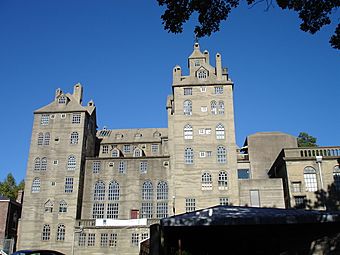Fonthill, Mercer Museum and Moravian Pottery and Tile Works facts for kids
Quick facts for kids |
|
|
Fonthill, Mercer Museum and Moravian Pottery and Tile Works
|
|

Mercer Museum, October 2006
|
|
| Location | Court St. and Swamp Rd. and Pine and Ashland Sts., Doylestown, Pennsylvania |
|---|---|
| Built | 1907 |
| Built by | Mercer, Henry C. |
| Architectural style | Colonial Revival, Other, Neo-Georgian |
| NRHP reference No. | 85002366 |
| Added to NRHP | February 4, 1985 |
The Fonthill, Mercer Museum and Moravian Pottery and Tile Works is a special group of buildings. They are located in Doylestown, Pennsylvania. These three places were built by Henry Chapman Mercer (1856-1930). He used a unique style called the Arts and Crafts movement. He also used a new building material: poured concrete. The three buildings are Fonthill, the Mercer Museum, and the Moravian Pottery and Tile Works. Today, all three are museums. They are managed by the Bucks County Historical Society. This group of buildings became a National Historic Landmark District in 1985. Each building is also listed on the National Register of Historic Places.
Contents
Who Was Henry Chapman Mercer?
Henry Chapman Mercer was born in Doylestown. He studied to become a lawyer. But he never worked as one. Instead, he became a curator at the University of Pennsylvania Museum. A curator is someone who takes care of museum collections.
Mercer's Interests and the Arts and Crafts Movement
Mercer was worried about the growth of factories. He saw that handmade items were disappearing. So, he started collecting old tools and objects. These items showed how people lived and worked in America long ago. He also learned about making pottery and tiles in Germany.
Mercer was inspired by the Arts and Crafts movement. This movement valued handmade items and traditional skills. It was a reaction against machine-made products. In 1898, Mercer started the Moravian Pottery and Tile Works. He built it in his hometown. His tiles became very popular. They were used in many buildings across the United States.
Building with Concrete
In 1907, Mercer began building Fonthill. This house was one of the first buildings in the U.S. to use reinforced poured concrete. Mercer designed Fonthill himself. He also designed the Mercer Museum. Both buildings, and the tile works, use poured concrete as their main material.
Fonthill: Mercer's Unique Home
Fonthill is located north of Doylestown's town center. It is on the west side of East Court Street. The house looks a bit like an old European castle. Its concrete walls are about 2 feet (0.6 meters) thick.
Inside Fonthill
The outside of Fonthill has many decorative tiles. Inside, the house is filled with Mercer's collections. He finished building Fonthill in 1912. You can visit Fonthill today by making an appointment.
Mercer Museum: A Collection of History
The Mercer Museum is located southeast of the town center. It is at East Ashland and Green Streets. Its outside design is similar to Fonthill. But it has more parts sticking out. This makes it look even more like a strong fortress.
Exploring the Museum
The inside of the museum has a large open space. A ramp winds around this space. Mercer's collection of old farm tools and industrial items are displayed here. They are placed in small areas and corners. The museum was finished in 1916. A library was added in the 1930s. It was built in a similar style.
Moravian Pottery and Tile Works: Still Making Tiles
The tile works building is just north of Fonthill. It is off Swamp Road. It was built between 1911 and 1912. The building looks like a medieval cloister. A cloister is a covered walkway with arches. It surrounds a central courtyard.
Tile Production Today
The main part of the building is 2.5 stories tall. It holds five kilns. Kilns are special ovens used to bake pottery and tiles. This facility still makes tiles today. They use the original molds created by Henry Chapman Mercer.
See Also
 | Kyle Baker |
 | Joseph Yoakum |
 | Laura Wheeler Waring |
 | Henry Ossawa Tanner |



